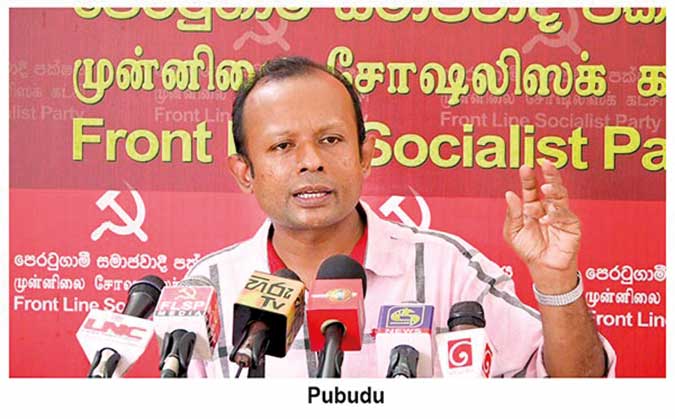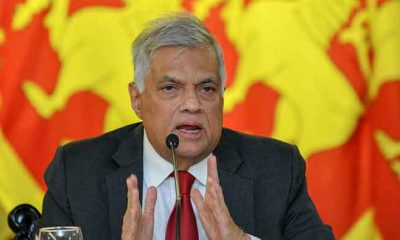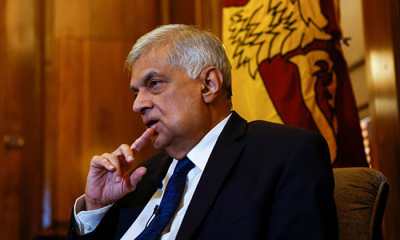News
FSP warns danger of negating country’s successful vaccination programme by importing low quality drugs

By Rathindra Kuruwita
Sri Lanka’s successful vaccination programmes will be undermined if the government continues to import low quality drugs, Education Secretary of the Frontline Socialist Party (FSP) Pubudu Jagoda told The Island.
“Sri Lanka is a role model for successful vaccination because people have no fear about vaccinating their kids. This is why the vaccination programme is successful. What will happen if public confidence in the quality of vaccines drops? People will not vaccinate their children and that would lead to many health problems. If people start worrying about anesthetics, they might hesitate to undergo surgeries. This can exacerbate the crisis in our healthcare,” he said.
The Sri Lankan governments have been abusing section 109 of the National Medicines Regulatory Authority (NMRA) Act, which allows importing unregistered drugs during emergencies, ever since COVID, Jagoda said.
Section 109 of the National Medicines Regulatory Authority Act notes that the ‘The Authority may grant permission in special circumstances, such as to save a life, to control an outbreak of an infection, or an epidemic, or any other national emergency, or for national security, to import and supply a particular medicine, medical device or borderline product in specified quantities.”
“More than anyone, the current Minister is abusing this section and has been importing many unregistered drugs,” he said.
Jagoda said that this section of the Act was not abused by health ministers, prior to COVID-19. Medical purchases in Sri Lanka were always corrupt, however, those in power made money by manipulating prices of registered and relatively high-quality drugs.
“We started importing low quality unregistered drugs following COVID. This is done in two ways. One is that the Minister can give a waiver of registration letter. Another technique is called consignment release. This is how it’s done. Each company must renew drug registrations each year. With consignment release, we allow the release of a drug, not registered this year, if it had been registered in a previous year. The drugs have to be tested and re-registered each year because drugs affect human health. A company might produce a high-quality drug in one year but a few years later there could be drastic drops in quality, due to many factors,” he said.
Jagoda added that when registering a drug in Sri Lanka, a group of experts conduct their own independent survey on the quality of the drug. Those in charge of registration, currently the NMRA, study reports on drug trials, journey articles, reports on whether there have been any side effects, etc.
“However, the NMRA is increasingly under political pressure. S.B. Jayaratne and Vijith Gunasekara, Chairman and CEO of NMRA, respectively, addressed a press conference recently. They were asked why the anaesthetic Bupivacaine, which is not registered and has caused several deaths, were allowed into Sri Lanka. The NMRA officials said when the Minister of Health asks them to do something, they have to do it. When the NMRA act was introduced, we said that the Minister should not be able to override professionals,” he said.
The FSP Education Secretary added that while the NMRA’s testing capacity must be enhanced, the main problem faced by them is political interference.
The quality of drugs can be proven chemically and clinically and a lot of countries do both because they have facilities. Sri Lanka, too, can access these reports easily and determine whether a drug should be allowed to come in.
“NMRA also has a good lab, and they are trying to close it down. Recently officials went there and asked the chemists there whether they can find new jobs if the lab is closed. The lab is only open because for some reason senior officials don’t want to fire chemists who work at the lab,” he said.
The use of low-quality drugs have already taken several lives in the country and have caused irreparable damage to the health of some people, he said. About 15 people lost their sight after an Indian-made eye drop, Prednisolone, was used following surgery. These cases were mainly reported in Nuwara Eliya, he said.
“Then there are issues with the Indian made anaesthetic Bupivacaine. About two months ago, a 60-year-old retired school principal became sick after Bupivacaine was used during her surgery. She died recently after over six weeks at the ICU. On 06 April, a pregnant woman died, also in Peradeniya, after the same anesthetic was used on her on 04 April. Bupivacaine was purchased from the Indian company Divine Laboratories Private Limited, and the drug is not registered in Sri Lanka. These are drugs imported without testing the quality and people have died because of that,” he said
On top of that, two machines used at Sirimavo Bandaranaike Specialised Children’s Hospital to administer anesthetics to children have broken down. Nothing has been done to replace or repair the machines and this has caused great distress, Jagoda said.
“We are now dependent on other countries for everything. We received an Indian credit line for medicine and we have to purchase the drugs from India. However, about 85 imported drugs used in Sri Lanka anyway came from India. Those are drugs checked and registered by the National Medicines Regulatory Authority (NMRA). The Indian government didn’t ask Sri Lanka to buy from unregistered suppliers. Recently, China gave us a soft loan to buy medicines for the Hambantota General Hospital. Sri Lanka purchased medical equipment from Chinese companies that are registered in Sri Lanka, not from new ones. These countries are not forcing our politicians and officials to buy from unregistered suppliers, this is on us,” he said.
News
US sports envoys to Lanka to champion youth development

The U.S. Embassy in Colombo welcomed the U.S. Sports Envoys to Sri Lanka, former National Basketball Association (NBA) and Women’s National Basketball Association (WNBA) players Stephen Howard and Astou Ndiaye, from June 8 through 14.
The Public Diplomacy section of the U.S. Embassy said that it would launch a weeklong basketball program intended to harness the unifying power of sports, made possible through collaboration with Foundation of Goodness and IImpact Hoop Lab.
While in Sri Lanka, Howard and Ndiaye, both retired professional basketball players, will conduct a weeklong program, Hoops for Hope: Bridging Borders through Basketball. The Sports Envoys will lead basketball clinics and exhibition matches and engage in leadership sessions in Colombo and Southern Province for youth aged 14-18 from Northern, Uva, Eastern and Western Provinces, offering skills and leadership training both on and off the court. The U.S. Envoys will also share their expertise with the Sri Lanka Basketball Federation, national coaches, and players, furthering the development of basketball in the country. Beyond the clinics, they will collaborate with Sri Lankan schoolchildren to take part in a community service project in the Colombo area.
“We are so proud to welcome Stephen and Astou as our Sports Envoys to Sri Lanka, to build on the strong people-to-people connections between the United States and Sri Lanka,” said U.S. Ambassador Julie Chung. “The lessons that will be shared by our Sports Envoys – communication, teamwork, resilience, inclusion, and conflict resolution – are essential for leadership development, community building, equality, and peace. The U.S. Sports Envoy program is a testament to our belief that sports can be a powerful tool in promoting peace and unity.”
News
Rahuman questions sudden cancellation of leave of CEB employees

SJB Colombo District MP Mujibur Rahuman in parliament demanded to know from the government the reasons for CEB suspending the leave of all its employees until further notice from Thursday.
MP Rahuman said that the CEB has got an acting General Manager anew and the latter yesterday morning issued a circular suspending leave of all CEB employees with immediate effect until further notice.
“We demand that Minister Kanchana Wijesekera should explain this to the House. This circular was issued while this debate on the new Electricity Amendment Bill was pending. There are many who oppose this Bill. The Minister must tell parliament the reason for the urge to cancel the leave of CEB employees,” the MP said.However, Speaker Mahinda Yapa Abeywardena prevented Minister Wijesekera responding to the query and said that the matter raised by MP Rahuman was not relevant.
News
CIPM successfully concludes 8th Annual Symposium

The Chartered Institute of Personnel Management (CIPM) successfully concluded the 8th Annual CIPM Symposium, which took place on 31st May 2024. Themed “Nurturing the Human Element—Redefining HRM in a Rapidly Changing World,” the symposium underscored the pivotal role of human resource management (HRM) in today’s dynamic global landscape. Since its inception in 1959, CIPM has been dedicated to advancing the HR profession through education, professional development, and advocacy, solidifying its position as Sri Lanka’s leading professional body for HRM.
Ken Vijayakumar, the President of the CIPM, graced the occasion as the chief guest. The symposium commenced with the welcome address by the Chairperson, Prof. Arosha Adikaram, followed by the Web Launch of the Symposium Proceedings and Abstract Book by the CIPM President. The event featured distinguished addresses, including a speech by Chief Guest Ken Vijayakumar, President of CIPM, and an address by Guest of Honor Shakthi Ranatunga, Chief Operating Officer of MAS Holdings Pvt. Ltd., Sri Lanka.
The symposium also featured an inspiring keynote address by Prof. Mario Fernando, Professor of Management and Director of the Centre for Cross Cultural Management (CCCM) at the University of Wollongong, Australia.
Vote of Thanks of the inauguration session was delivered by Dr. Dillanjani Weeratunga, Symposium Co-chair.
The symposium served as a comprehensive platform for researchers to present their findings across a wide range of critical topics in HRM. These included Cultural Diversity and Inclusion, Talent Development and Retention, Ethical Leadership and Corporate Social Responsibility, Adapting to Technological Advancements, Mental Health and Well-being at Work, Global Workforce Challenges, Employee Empowerment, and Reskilling and Upskilling.
The plenary session was led by Prof. Wasantha Rajapakse. Certificates were awarded to the best paper presenters during the valedictory session, followed by a vote of thanks delivered by Kamani Perera, Manager of Research and Development.
The annual symposium of CIPM was a truly inclusive event, attracting a diverse audience that spanned undergraduates, graduates, working professionals, research scholars and lecturers. This widespread interest highlights the symposium’s significance in the field of HRM, offering a unique opportunity for everyone to network and learn from scholarly brains.The CIPM International Research Symposium was sponsored by Hambantota International Port, Sri Lanka Institute of Information Technology (SLIIT), E B Creasy & Co. PLC, and Print Xcel Company.
























